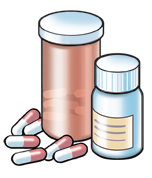You have been evaluated and treated for taking a substance with the intent to harm yourself. There is no sign of a toxic effect now. It's not likely that you will have any new symptoms. To be safe, watch for new symptoms during the next 24 hours (see below).
Symptoms will depend on the type of substance you took. Overdosing on purpose is likely a sign that you are depressed. Or you may be very angry with yourself or someone else. This is why you have received a psychiatric evaluation. It's very important for you to follow the instructions in this evaluation.
Home care
-
If you are sent home, have someone stay with you. The impact of the overdose on your feelings may not sink in for a while.
-
Have the person remove all from your home that you could use to harm yourself. These include things like drugs or weapons. They should put them in a place that's unknown to you.
-
Make sure you get the suicide prevention hotline numbers and emergency numbers. And be sure you have the number for your health care provider. Keep these numbers where they are easy to find. Give them to your friends and family members.
-
If you were given liquid charcoal, your stools will look black for 1 to 2 days. A laxative may have been given with the charcoal. This makes the toxins leave your body faster. It may cause diarrhea for up to 24 hours.
-
If you were given charcoal but not a laxative, you may get constipated. If you do, you may take an over-the-counter laxative.
In an emergency
Once you get home, keep a list of emergency numbers near. This list should include:
-
Trusted family members.
-
Friends.
-
Your doctor.
-
The 988 Suicide & Crisis Lifeline. You can call or text 988 to reach trained crisis counselors at the 988 Lifeline. There's also an online chat option at www.chat.988lifeline.org . You can also call Lifeline at 800-273-TALK (800-273-8255). Lifeline is free and you can use it 24/7.
Follow-up care
Following up with a mental health professional after an overdose is crucial for your safety and well-being.
-
If you go home, have someone stay with you. They should stay there until you follow up with your doctor, clinic, or therapist. Do this as soon as you can.
-
If you feel the urge to harm yourself again, call or text
988 . You will connect with trained crisis counselors at the National Suicide Prevention Lifeline. -
If you were given information about a doctor, therapist, or clinic, follow up with them.
-
If you get discharged for evaluation right away at a mental health facility on a voluntary basis, go straight there with a trusted adult.
-
If you've been placed on a mental health hold, you will get more care. A ride to a facility will be arranged for you.
If you or someone you know takes something that may be harmful, call Poison Control Center at 800-222-1222. Someone is there to help 24 hours a day. You'll be connected to the poison control center closest to you.
Call 911
Call
-
You have an intense desire to harm yourself, and a way to carry it out.
-
You have trouble breathing or swallowing.
-
You are wheezing.
-
You have severe confusion.
-
You are extremely drowsy or have trouble waking up.
-
You faint or lose consciousness.
-
You have a fast heart rate.
-
You have a very slow heart rate.
-
You have very low blood pressure.
-
You have very high blood pressure.
-
You vomit blood.
-
You have large amounts of blood in your stool.
-
You have a seizure.
When to get medical advice
Contact your health care provider right away if:
-
You are shaky.
-
Your breathing is fast (more than 25 breaths per minute).
-
Your breathing is slow (less than 8 breaths per minute).
-
You are short of breath
-
You have a fever of 100.4ºF (38ºC) or higher, or as advised by your health care provider.
-
You have shaking chills.
-
You vomit or have diarrhea for more than 24 hours.
-
You have belly pain.
-
You are dizzy.
-
You feel weak.
-
You have thoughts of harming yourself again (call or text
988 ).
For more help
-
Substance Abuse and Mental Health Services Administration Helpline at www.samhsa.gov/find-help/national-helpline or 800-662-HELP (800-662-4357)
-
National Alliance on Mental Illness at www.nami.org or 800-950-6264 or text NAMI to 741741
-
Mental Health America at www.nmha.org or 800-969-6642


